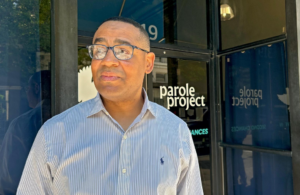Betty was one of the oldest women serving a life sentence in Louisiana before her conviction was vacated and she was freed in the spring of this year. Now 75, Betty spent the last 38 years in prison for an action that should never have been prosecuted. Before her release, Betty was one of the 230,000 women and girls in U.S. jails and prisons who were abuse survivors before they entered the system. Like many women convicted of murder or manslaughter, she was punished for protecting herself and her children from physical and sexual violence.
A carpenter by trade, Betty was a young single mother in 1983 when she moved to New Orleans to find work. There was a construction boom going on as the city prepared for the 1984 World’s Fair Exhibition. Shortly after she settled in, a man, armed with a gun, entered her apartment and repeatedly assaulted her. In a desperate attempt to save herself and her children, Betty shot her assailant with his own gun. By today’s standards this was clearly an act of self-defense. At the time, however, Betty’s victimization wasn’t considered, physical evidence of her assault wasn’t collected, and her explanation of the shooting was ignored.
Betty would become part of a group that advocates are now calling criminalized survivors.
According to a 2016 study published by the Vera Institute of Justice, 86 percent of women in prison are survivors of sexual violence, and 77 percent are survivors of intimate partner violence. Women who have experienced abuse as children or in adulthood are more likely to be incarcerated than women who have not. According to report on the sexual abuse to prison pipeline by the National Online Resource on Violence Against Women, “Strategies that women use to cope with the effects of and survive in the face of violence and abuse include behaviors that have been deemed criminal, such as fighting back, substance use, and theft.” A 2018 WWL-TV investigation revealed 21 women out of more than 100 serving life sentences in Louisiana were all convicted for killing their abusers. Women of color, members of the LGBT community, and other disenfranchised populations are disproportionately affected by the sexual abuse to prison pipeline phenomena.
Parole Project helped Betty restart her life by providing transitional housing and programming so she could navigate the very different world to which she returned. Today Betty lives in Texas, and she is looking to re-enter the workforce as a paralegal. She is thrilled to live close to her son and plans to spend plenty of time with her grandchildren.




